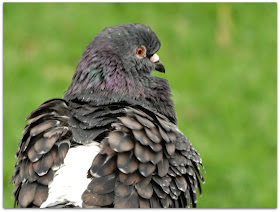Next to Online Dictionary to define this word. It tells me feral means 'existing in a wild or uncultivated state' and so I think, could we apply that word then before every wild bird's name?
A Feral Laughing Kookaburra, or a Feral Red-backed Fairy-Wren, doesn't quite make the grade somehow.
I know, we wouldn't really choose to make that name change to others, since it generally has an unfavourable inference. Just thinking out loud here ...because I can.
Several were sitting on the mowed grass in Paddington, Sydney, on an overcast day and with a little intermittent rain. I still like the differing colours amongst them. It surprised me when looking into the photos, how the top beak curved over, and wondered if this indicated the older bird, or are they typically like this?
this one's not got the curved beak
several took turns at having a splash in this water feature
Did you know? Pigeons can fly at altitudes of 1.8 km (6000 feet), or more!! Read that here on Pigeon Control Resource Centre.






What beautiful birds !
ReplyDeleteHave a happy weekend :)
Lovely captures of the beautiful colors on the pigeons. Wonderful post and photos, Carole! Happy weekend!
ReplyDeleteNice feather detail! Great markings, too!
ReplyDeleteThey're rather pretty. That is interesting about the hooked bill on the one bird.
ReplyDeletethey really are beautiful. great shots!
ReplyDeleteBeautiful pictures of the pigeon.
ReplyDeletePerfect photographed Carole.
I'm not sure what it is about them, and I know that lots of folks don't agree, but I just love these "guys!"
ReplyDeleteYou have captured those "feral" birds beautifully. We refer to wild cats as feral here, but not necessarily birds.
ReplyDeleteYes you got me wondering about the 'feral' term. Perhaps it was used to set aside those pigeons that weren't kept and raised as racing pigeons etc. Who knows, interesting to ponder things sometimes though isn't it.
ReplyDeleteWhen we were in our home with a bit of land, we had some pigeons who bred and raised their chicks within our yards. They became quite tame. They're so gentle and it is a pleasure to see your photos. I always get a delight in seeing those luminous feathers. Lovely photography Carole :D)
I recently had trouble finding the "proper" name of these "feral pigeons" when filling in a sighting list on Eremaea.They were listed as Rock Pigeon. I had only known them as a "domestic pigeon" prior to this.
ReplyDeletewhat great images you've shared. i especially like the one where they're taking turns at the water fountain... that black one waiting it's turn looks to be all dressed up and ready to go out on the town. beautiful... hope all is well. have a great weekend, what's left. oh, and thanks for stopping by...
ReplyDeleteSuch lovely pigeons Carole, love the close-ups of them.
ReplyDeleteThey are pretty birds!
ReplyDeleteJan
"Feral" refers to birds which were once domesticated but have subsequently escaped into the wild and flourished there - if places like Trafalgar Square can be considered as "wild".
ReplyDeleteAnd that one, really Feral. Precious photos.
ReplyDeleteCarole, very nice series of photographs!
ReplyDeleteIt's easy to overlook the beauty of a bird which is often very common. Your images really show off these attractive birds.
Nomenclature was recently changed for reporting sightings of these birds from Rock Pigeon (Domestic) to Rock Pigeon (Feral). Feral in this case meaning having returned to an untamed state from domestication.
In some parts of the world, there are still remnants of wild pigeons and are reported as Rock Pigeon (Wild Type).
Interesting stuff for some of us, too much information for others and probably more than you wanted to know! :)
Amazing -- I didn't know any bird flew that high? I guess we could say they made the mile-high club?
ReplyDeletenice to know that the Feral Pigeon isn't dismissed entirely, since you have left these comments. The extra info' also on the origin of the 'feral' tag is also appreciated. An email also from my friend Maggie S in Nthn. Qld, said "Basically feral refers to introduced species that have escaped into the wild... so domestic pigeons, cats, foxes, Norwegian rats are feral but native animals are not feral in Australia... however where they have escaped in other countries (eg budgies in the US, wallabies in the UK) they qualify as feral".
ReplyDeleteLovely images of the Feral Pigeon, Carole. They do have quite nice markings, don't they?
ReplyDeleteI was aware that the term feral in their name was referring to introduction and subsequent escape into the wild.
As John above also mentioned the term "feral" is clearly evident in places like Trafalgar Square in London as they have literally taken over. It's very sad as the historic statues were constantly covered in bird poo as were the seats, fountains, etc. The council has erected signs all over the square insisting on people not feeding them as that had further encouraged their increase.